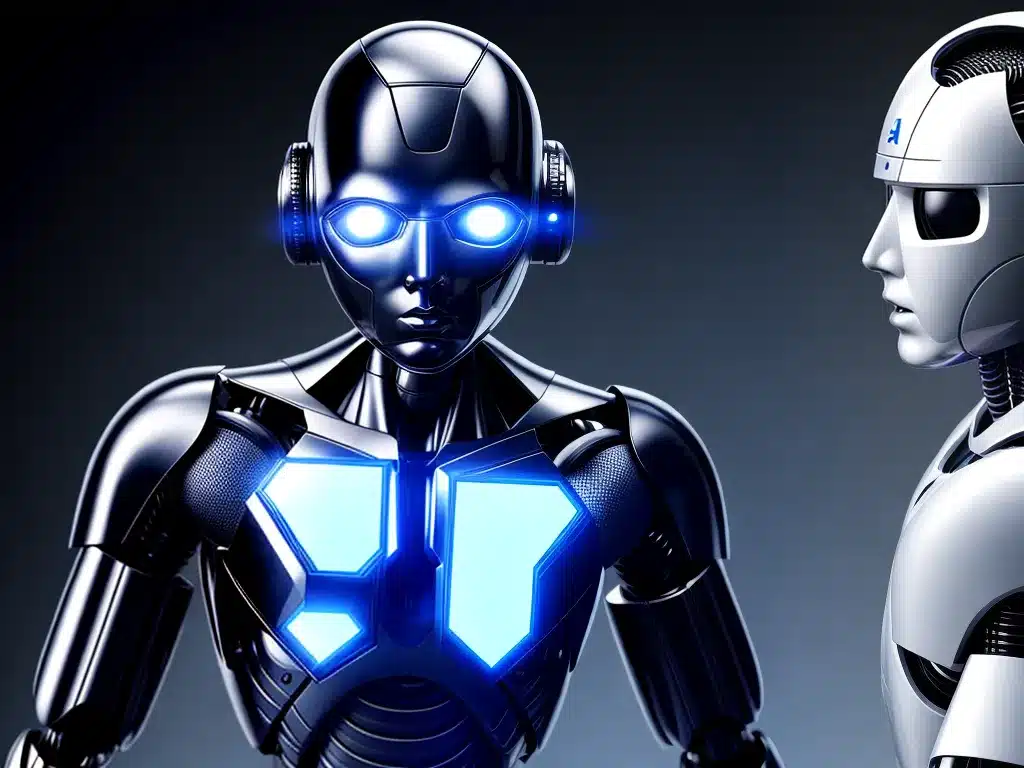
Introduction
Artificial intelligence (AI) is one of the most transformative technologies of our time. As AI systems grow more powerful and ubiquitous, concerns emerge about their potential impacts on humanity. On one hand, AI promises immense benefits for society. On the other hand, uncontrolled AI risks unintended consequences. The debate boils down to a key question: Will artificial intelligence prove to be friend or foe? I aim to explore both perspectives in depth.
The Case for AI as Friend
Enhancing Human Capabilities
Many experts see AI as a collaborator and enhancer of human abilities. AI excels at analyzing data, recognizing patterns, and optimizing processes. It can amplify what humans already do well. For instance, AI can help doctors diagnose illnesses from medical scans with greater speed and accuracy. Rather than replace radiologists, AI makes them more effective at their jobs. With the help of AI, human workers can focus on tasks requiring emotional intelligence, creativity, and judgment.
Improving Lives
AI applications have the power to profoundly improve people’s lives. In transportation, self-driving cars can reduce accidents and grant mobility to the elderly and disabled. In healthcare, AI is enabling more personalized medicine and accelerating medical research. Other uses like adaptive learning software, predictive policing, and fraud detection make society safer, more efficient, and more equitable. While AI will disrupt some jobs, it will also create new kinds of employment and free up human time for leisure and creative pursuits. With guidance, its benefits can be shared broadly.
Addressing Global Challenges
AI has the potential to help address urgent global problems such as climate change, food insecurity, and disease. AI-powered systems can optimize growing patterns and water usage to boost crop yields. AI data analysis enables more accurate weather forecasting and climate modeling. In combating COVID-19, AI sped up vaccine and drug development. It also allowed doctors to more accurately track the spread of the virus. Applied thoughtfully, AI can be a tremendously positive force for humanity.
The Case Against AI
Job Displacement
One major concern is that as AI matches or exceeds human capabilities in many domains, it will displace large numbers of workers. truck drivers, data entry clerks, paralegals, accountants, and even radiologists face uncertain futures as AI encroaches on once-safe occupations. While new kinds of jobs will emerge, many displaced workers lack the skills to transition fields and will suffer declining livelihoods. Mass unemployment fueled by AI could destabilize economies and societies.
Loss of Control
As AI systems become more autonomous, interpreting situations and making decisions without human oversight, the possibility of unintended harm grows. Algorithmic biases could lead driverless cars to prioritize young, white pedestrians over seniors and minorities. AI chatbots could be weaponized to spread misinformation and propaganda online. Lethal autonomous weapons like drones represent a frightening loss of human control over life and death decisions. Without transparency and accountability, unchecked AI could have dire implications.
Existential Threat
In the long run, the greatest danger lies with superintelligent AI surpassing human-level cognitive abilities. Once an AI becomes capable of recursively self-improving, its intelligence could rapidly exceed our ability to understand or constrain it. A superintelligence with misaligned goals could pose an existential threat to humanity. Its objectives could lead it to methodically seize control of vital resources and eradicate opposition. This scenario keeps many AI safety researchers up at night.
The Path Forward
Thoughtful Governance
Rather than extremes of AI optimism or alarmism, nuanced governance can guide technology for the common good. Laws and regulations can ensure AI aligns with human values and promotes shared prosperity. Algorithms and data must be transparent and accountable to the public. Technology firms and governments should implement strong oversight bodies and ethical standards. With democratic control, AI can empower society.
Prioritizing Human Wellbeing
Technologists have an obligation to pursue AI development carefully and conscientiously. Research must focus on making AI systems robust, trustworthy and beneficial for humanity. This means instilling moral and ethical reasoning capabilities in AI. It also means keeping humans firmly in the loop for key decisions. AI should not be handed autonomy until it reliably aligns with human preferences. Responsible innovation will allow AI’s full potential for good.
Preparing for Disruption
While AI will generate many new opportunities, it will also profoundly alter how we live and work. Individuals, businesses and governments should thoughtfully prepare. Education should foster adaptability and retraining programs can help workers transition into new roles. Farsighted policies can support those disadvantaged and cultivate wide-ranging resilience to disruption. With planning and foresight, societies can navigate AI’s uncertainties.
Conclusion
Artificial intelligence brings immense promise along with risks. With care and wisdom, I believe humanity can harness AI’s capabilities for the betterment of all. But we must proceed with thoughtful governance, prioritize human flourishing, and prepare society for technological shifts. If we act judiciously, AI can be a collaborative partner in advancing human potential. With prudent management of this transformative technology, artificial intelligence can indeed prove itself a faithful friend.












